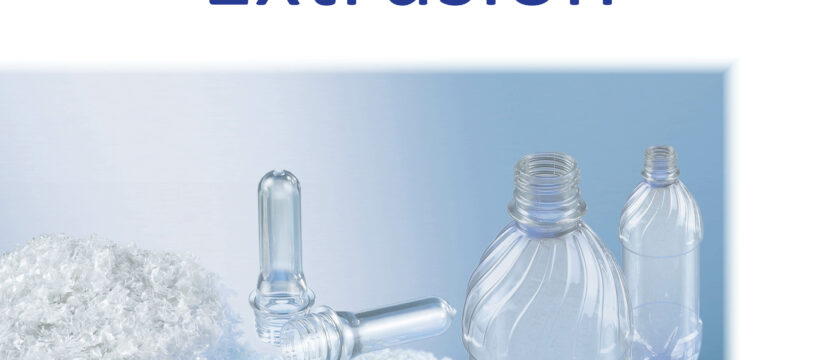Pipes, sheets, profiles and hoses in almost any length: next to injection molding, extrusion is the most important process in the plastics industry. In fact, more thermoplastics and elastomers are forced through molding dies at high pressure than are cast: Extruding and extrusion blow molding are used to process about 25 million tonnes of plastics per year in Europe. Ceresana has specifically examined the European market for extrusion plastics.
Soft Rubber, Rigid PVC
Extrusion was originally developed by the rubber industry. Today, the process is primarily used for thermoplastics, particularly for the plastic grade polyvinyl chloride (PVC). The second most important type of plastic for extrusion is polyethylene-LDPE with a market share of around 21%. The current study by Ceresana also provides market data on polyethylene-LLDPE and HDPE, polypropylene (PP), polystyrene (PS), polyethylene terephthalate (PET), and other plastic grades.
Tons of Thin Packaging Film
The most important sales market for extrusion products in Europe is the packaging industry, with over 12 million tonnes. Thin extruded plastic tubes are inflated and cut into films, bags, pouches and sacks of all kinds. Packaging films include a large part of the films used for food, but also films in the non-food sector, such as packaging for cosmetics, hygiene products, textiles or stationery. The market for packaging films is benefiting from a continuous trend towards flexible packaging solutions in many segments. In addition to weight and resource savings, this should also increase consumer convenience. The most important plastic grade in the packaging sector is polyethylene-LLDPE, followed by LDPE and polypropylene.
Extruded Window Frames and Door Seals
The second largest area of application for plastic extrusion is the construction industry. By far the most important type of plastic in this sector is polyvinyl chloride: In 2021, 3.7 million tonnes of PVC were used for this purpose in Europe. The most important plastic products in the construction industry are pipes and windows. In addition, many other construction elements are made of plastic: Floors, covers, facade parts, coatings, films, sheets, sealants, doors, as well as small parts and fasteners. However, the most dynamic development in demand for extrusion plastics is not expected to be in the construction sector, but in the automotive sector: Ceresana expects European demand in the „transportation“ application area to increase by 1.7% per year until 2031.
Current Market Data for Plastics Extrusion
Chapter 1 provides a description of the European plastics extrusion market – including forecasts up to 2031. Demand and revenues are outlined for countries in Western and Eastern Europe. It also breaks down demand for each type of plastic: polyvinyl chloride (PVC), polyethylene (LDPE, LLDPE, HDPE), polypropylene (PP), polystyrene (PS), polyethylene terephthalate (PET) and others. Chapter 2 looks at country-specific market data for 22 countries in Europe, i.e. demand and revenues of extrusion plastics in each case. Demand is examined in detail for individual product types and various application areas: Packaging, Construction, Transportation, Electrical & Electronics (E&E), Industrial Products and others. Chapter 3 provides a useful directory of the 74 most important European companies in the plastics extrusion sector. It is clearly organized by contact details, revenues, profit, product range, production facilities and brief profile. The companies featured include, for example, Aliaxis S.A., Amcor Ltd., Bolloré Divisions Films Plastiques, Covestro AG, Geberit AG, Georg Fischer AG, Huhtamäki Oyi, Mitsubishi Corporation, Mondi Group, Saudi Basic Industries Corp. (SABIC), Sealed Air Corporation, and Toray Industries, Inc. Further information about the new market study “Plastics Extrusion – Europe”: https://ceresana.com/en/produkt/plastic-extrusion-market-report-europe
About Ceresana
As one of the world’s leading market research institutes, Ceresana specializes in the chemicals, plastics, packaging and industrial goods sectors, with a focus on bioeconomy and automotive / mobility. Since 2002, companies have benefited from high-quality industry analyses and forecasts. Over 200 market studies provide more thanpackaging 10,000 clients around the world with the knowledge base for sustainable success.
More about Ceresana at www.ceresana.com
Ceresana
Mainaustrasse 34
78464 Konstanz
Germany
Press Contact: Martin Ebner, m.ebner@ceresana.com

